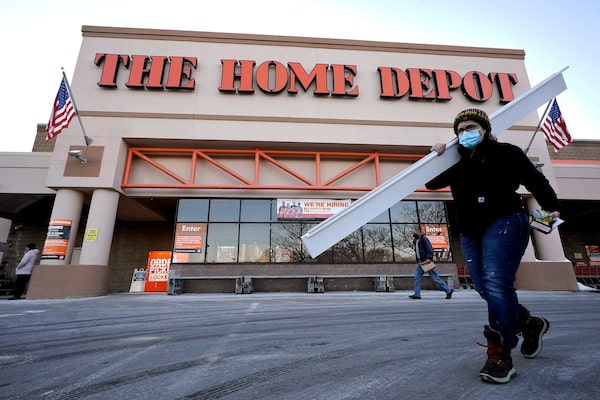
Home Depot's consumer discretionary stock value has dropped by 32 per cent.Steven Senne/The Associated Press
Forget tech stocks, the consumer sector has been the main clearing house for investor hopes and fears about inflation, interest rates, and the economy.
Consumer discretionary stocks, specifically, have the worst returns of any S&P 500 sector, with year-to-date losses sitting at 29 per cent. The same sector in Canada is down by 15 per cent since the start of the year – badly trailing the S&P/TSX Composite Index, which has declined by 9 per cent.
Big names in American retail have borne the brunt of the selloff: Target Corp. TGT-N has fallen by 44 per cent from its 52-week high, Starbucks Corp. SBUX-Q by 38 per cent and Home Depot Inc. HD-N by 32 per cent.
As high inflation lingers, retailers brace for a tapped-out consumer
On the Toronto Stock Exchange, Canada Goose Holdings Inc. GOOS-T has seen its shares plummet by 62 per cent, Aritzia Inc. ATZ-T by 40 per cent and Sleep Country Canada Holdings Inc. ZZZ-T by 37 per cent.
Short-sellers have piled on the pressure, making consumer discretionary the most heavily shorted U.S. sector with 5.5-per-cent short interest as of the end of last month, according to data from S&P Global Market Intelligence.
That’s just the kind of one-way trade to quicken the pulse of the contrarian investor who, in this case, is emboldened by the unusually strong financial position of the average consumer.
Cushioned by high employment and savings accumulated throughout the pandemic, Canadian and U.S. households have continued to spend even as prices soar.
The problem is that the only way for policy-makers to extinguish the inflation problem is to stifle demand. And while inflation itself has not yet peaked, there are early signs of cracks emerging in the consumer sector.
“People are definitely still spending,” said Diana Orlic, a portfolio manager at Richardson Wealth. “But for the average consumer, seeing all these headlines about global food shortages and high gas prices with no relief in sight, that can start to scare you.”
Recent consumer surveys certainly back that up. The University of Michigan’s closely watched consumer sentiment index for June hit its lowest level on record, dating back to 1952.
And yet, while most consumers expect tough times ahead and are worried about inflation eroding living standards, they have continued to splurge.
Retail spending in Canada rose by 0.9 per cent in April and preliminary data suggest it remained robust in May. In the U.S., personal consumption grew 3.1 per cent in the first quarter, even as the overall economy shrank due to a wider trade deficit and a slowing accumulation of business inventories.
“The consumer has been supporting the U.S. – and, to a large extent, the world – economy all year,” Ajay Rajadhyaksha, Barclays global chair of research wrote in a recent report.
Many households emerged from the worst of the pandemic with a sizable nest egg, largely as a result of reduced spending on services.
At the start of this year, U.S. households had US$2.5- to US$3-trillion in excess savings, over and above what they would have had if COVID-19 had never happened, Mr. Rajadhyaksha said. Canadian households, meanwhile, saved up an extra $324-billion, according to Royal Bank of Canada estimates.
That huge financial cushion poses a problem for policy-makers. “The only way out of this is to seriously chill demand,” Bank of Montreal chief economist Doug Porter wrote. But “many households are able to pay higher prices. This just makes the interest rate hill that central banks need to climb that much higher.”
In other words, the rate hikes will keep coming until consumer demand is reined in. And that spells trouble for certain retailers.
“You’ve really got to pick your spots carefully,” said Stephen Takacsy, chief executive officer at Lester Asset Management. Big-ticket items would be the first to be cut from family budgets, putting stocks like Bombardier Recreational Products Inc. – maker of recreational vehicles such as snowmobiles – under pressure.
“And I’d be very careful with fashion retailers. If their stuff doesn’t sell this quarter, they’ve got to mark it down,” Mr. Takacsy said.
Ms. Orlic said she is focusing on consumer discretionary names paying a healthy dividend, such as Restaurant Brands International Inc., the parent company of Tim Hortons and Burger King. Its stock is down by 16 per cent on the year.
Be smart with your money. Get the latest investing insights delivered right to your inbox three times a week, with the Globe Investor newsletter. Sign up today.